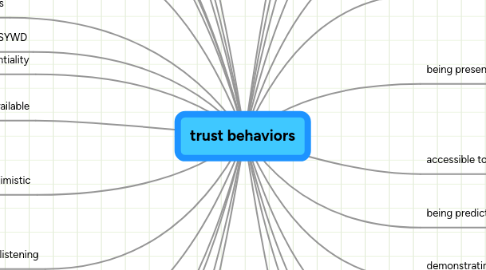trust behaviors
by Michael Tighe


1. Neue Idee
1.1. Neue Idee
2. suspend doubt and pre-judging
3. communicate plainly
3.1. intercultural communication awareness
3.2. reinforce communications with visuals
4. demonstrate care for team members
5. speak with good purpose
6. explain inconsistancy
7. over communicating
7.1. over simplified language
7.2. increased frequency
7.3. asking what was understood
7.4. multiplicity of chanels
8. not talking behind people's backs
8.1. speaking with good purpose at all times
8.2. non-tolerance of behavior
9. keeping promises DWYSYWD
10. keeping confidentiality
11. being available
11.1. clear contact chanels
11.2. office hours
11.3. ask for contact
12. being optimistic
12.1. focus on benefits
12.2. use positive feedback often
12.2.1. for individuals
12.2.2. for the team
12.3. consciously praise
13. listening
13.1. confirming behaviors
13.2. asking questions
13.3. taking alternatives seriously
14. handle conflict professionally
14.1. goal conflict+
14.2. method conflict+
14.3. personal conflict-
14.3.1. manage conflict -don't solve conflict
14.4. cross-cultural communication conflict
15. using people's names
16. passing on trust and responsibilities
16.1. alternating virtual meeting facilitators
16.2. assigning sub teams
16.3. balance pleasant and unpleasant tasks
17. keeping everyone informed always
17.1. appropriate distribution of information
17.2. explain non-inclusion
17.3. recordings of sessions
18. deliver on every promise
18.1. role model behavior
18.2. no matter how insignificant
18.3. document promises
19. celebrate trust
19.1. talk about it
19.2. talk about how you enjoy it
19.3. ask others how they feel
20. confirm understanding
20.1. ask "what" not "if"
20.2. explain miscommunication common
21. talking about trust openly
21.1. teaching feedback methods
21.2. serving as a role model
21.3. expecting team members to talk about trust
22. admit mistakes quickly
23. being inclusive
23.1. push members to demonstrate skills
23.2. pass on the microphone
23.3. assign interrelated tasks
23.4. be aware of the quiet ones
24. solving problems not blaming people
25. being present
25.1. over communicate
25.1.1. use a variety of media
25.1.2. communicate frequently
25.2. use visuals and text
25.2.1. profiles
25.2.1.1. partner interviews
25.2.1.1.1. Neue Idee
25.2.2. team images
25.3. reveal personal information
25.3.1. reveal your own
25.3.2. team member personal information
25.4. appropriate platforms
26. accessible to everyone
26.1. ask everyone
26.2. speak their language
27. being predictable
27.1. rituals for communications
27.2. be consistant at all times
27.3. ask team members to be consistant
28. demonstrating competence
28.1. professional expertise
28.2. soft skill competence
29. giving support
29.1. being proactive
29.2. asking if support is needed
29.3. networking support in the group
29.4. timely
30. setting realistic expectations
31. taking initiative
31.1. asking
31.2. frequent reflectionon team behaviors
31.3. proactive measures
32. planning for trust
32.1. plan activities
32.1.1. warm ups
32.1.2. code of conduct
32.1.3. personal identity activities
32.1.4. team identity activities
